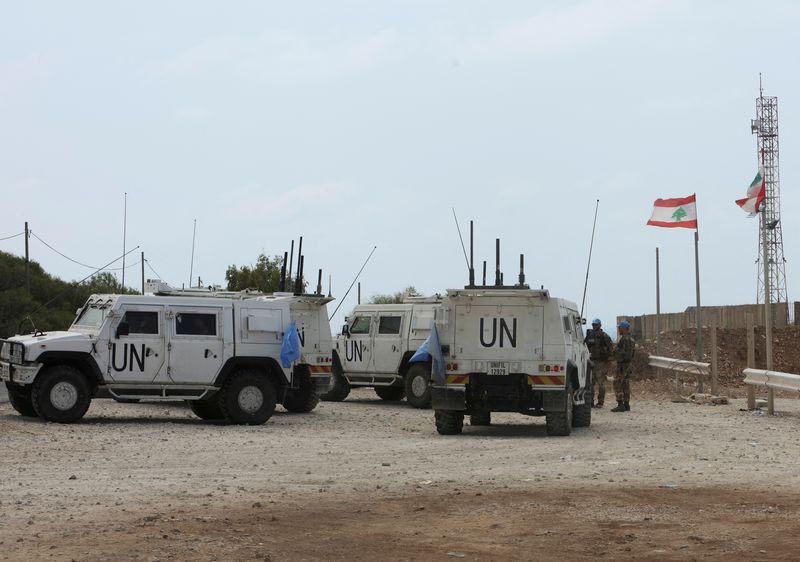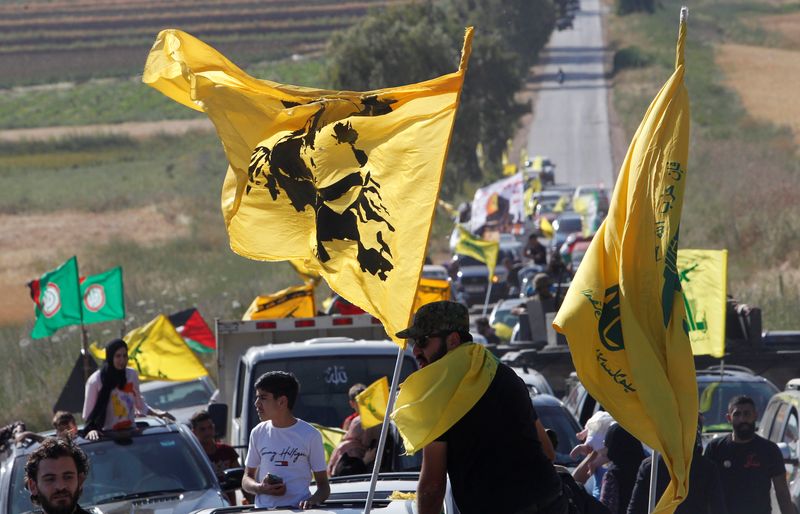By James Mackenzie, Dan Williams, Maya Gebeily and Laila Bassam
JERUSALEM/BEIRUT (Reuters) - An escalating war of words between Israel and Iran-backed Hezbollah in Lebanon echoes heightened tension at the border, with each vowing to return the other to the "stone age" and preparing for a possible conflict even as they deny seeking one.
Israel and Hezbollah have avoided war across the Lebanese-Israeli frontier since their last major clash 17 years ago, deterred by mutual threats of destruction. Syria has meanwhile served as an arena for their conflict.
But the calm has been put under strain by a series of incidents which have added to the risks of escalation as regional tensions simmer over Iran's nuclear programme and as Israel-Palestinian violence surges, analysts say.
The tensions come against the backdrop of a political crisis in Israel that has emboldened its enemies. Hezbollah, relishing the sight of some reservists refusing to serve, says Israel is now weaker. Israel says its foes are overestimating the impact.
Israel says Hezbollah is acting ever more brazenly, most notably in March when it blamed the group for a roadside bombing that wounded a motorist. Far from the border, the infiltration marked a type of attack Hezbollah is not known to have tried previously. Hezbollah has not denied responsibility.
An Israeli defence official told Reuters the attack was meant to cause major casualties and "had that happened, the northern front would have gone up in flames".
The recent spate of incidents at the border has included rockets being fired at Israel during flare-ups of Israeli-Palestinian violence, and members of Hezbollah or its supporters facing off with Israeli forces.
Tensions have also simmered over a tent pitched by Hezbollah on land which U.N. peacekeepers say is on the Israeli side of the Blue Line - a U.N.-mapped frontier marking the line to which Israeli forces withdrew when they left south Lebanon in 2000.
Hezbollah has meanwhile accused Israel of "dangerous measures" in Ghajar, a border village partly claimed by Lebanon which has been fully enveloped into Israel by a fence.
'MORE AND MORE BRAZEN'
Israeli National Security Adviser Tzachi Hanegbi, in an Aug. 7 media briefing, said Hezbollah was becoming "more and more brazen", speculating that Iran was trying to convince the group "to take more and more risks, and we would be sucked into this conflict even though we don't want any conflict in Lebanon".
Hezbollah's media office did not respond to a request for comment. Iranian authorities were not immediately available for comment.
A source familiar with Hezbollah thinking said it had taken a decision not to allow any provocations to prompt war and wanted to preserve the calm. The source, who spoke on condition of anonymity because of the sensitivities, added that when Hezbollah wants to go to war, this would be the result of a decision and not a provocation.
Israel sees Hezbollah, founded by Iran's Revolutionary Guards in 1982, as the biggest threat at its borders.
The 2006 war killed 1,200 people in Lebanon, mostly civilians, and 157 Israelis, mostly soldiers.
Since then, Hezbollah's arsenal has expanded.
In a speech marking the conflict's anniversary, Hezbollah cleric Hassan al-Baghdadi said its weaponry had stopped Israel from waging war. But Israel, he said, was in "dire need" of a war to forge unity because of its crisis.
A Western diplomat said there was a "risk that Hezbollah and others misinterpret what is happening in Israel as a signal of weakness: that they get over-confident and think they can do something".
"The Israelis are more concerned about the possibility of conflict with Hezbollah than they were 12 or 24 months ago," the diplomat said, adding that while this did not make conflict inevitable, the risk had increased.
WAR GAMES
Hezbollah invited media in May to watch its elite Radwan fighters simulate an invasion of Israel.
Israel has also been preparing.
Prime Minister Benjamin Netanyahu in June published a video showing the convening of his security cabinet in Tel Aviv military headquarters to simulate a war on Hezbollah and Iran.
"The tension has significantly increased over the last two or three months. But ultimately life goes on as usual," an Israeli military officer told Reuters.
Mohanad Hage Ali of the Carnegie Middle East Center said an emboldened Hezbollah was seeking to "change the rules of engagement" while tightening its alliance with Palestinian factions in the occupied West Bank and Gaza.
"There's now a rule in which if there's a violation in Jerusalem at Al-Aqsa Mosque or extended escalation in Palestinian territories, Lebanon's southern borders witness skirmishes or rocket launches," he said.
"It's a very risky business."
Lebanon can ill afford conflict four years into a financial meltdown that has paralysed the state. Hezbollah last year gave its blessing to a maritime border deal with Israel that allows Lebanon to explore for offshore energy.
Major General Lázaro, commander of the UNIFIL peacekeeping force, expressed concern over incidents along the Blue Line which have increased tensions at a meeting with Israeli and Lebanese officers, UNIFIL said.

UNIFIL spokesperson Andrea Tenenti said none of the incidents escalated "thanks to our work and the commitment of the parties".
"Nonetheless, any incident always has the potential to become something more."
